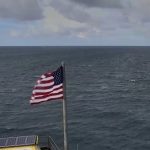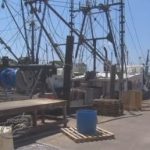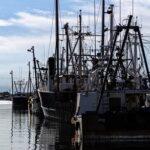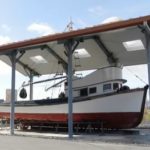Tag Archives: Marianne LaCroix
Maine Lobster Marketing Collaborative to celebrate National Lobster Day
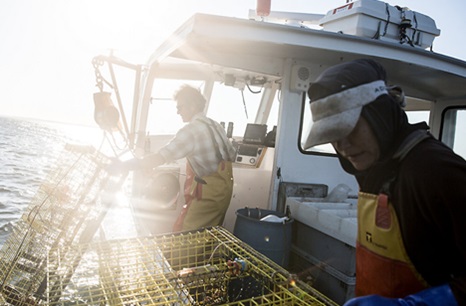 The Maine Lobster Marketing Collaborative is celebrating its ninth annual National Lobster Day on Wednesday, Sept. 25. “It’s a time to celebrate the lobstermen that are out on the water every day catching lobster and bringing it to market for us,” said Marianne LaCroix, executive director for Maine Lobster Marketing Collaborative. The celebration comes as Maine Lobster Week kicked off across the state Sunday and will be running until Sunday, Sept. 29. The day was moved from June to September to align with the peak lobster harvesting season. The Senate passed a resolution in 2015 officially recognizing the day and the economic impact of the industry. more, >>CLICK TO READ<< 10:45
The Maine Lobster Marketing Collaborative is celebrating its ninth annual National Lobster Day on Wednesday, Sept. 25. “It’s a time to celebrate the lobstermen that are out on the water every day catching lobster and bringing it to market for us,” said Marianne LaCroix, executive director for Maine Lobster Marketing Collaborative. The celebration comes as Maine Lobster Week kicked off across the state Sunday and will be running until Sunday, Sept. 29. The day was moved from June to September to align with the peak lobster harvesting season. The Senate passed a resolution in 2015 officially recognizing the day and the economic impact of the industry. more, >>CLICK TO READ<< 10:45
Maine State Chamber of Commerce puts spotlight on lobster
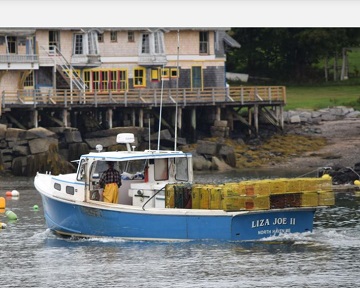 Maine lobster contributes $1.4 billion to the state economy and 4,000 jobs on the shore, from live lobster dealers to processors to workers on the piers. And those numbers don’t include lobster-based tourism, Linda Caprara, interim CEO of the Maine State Chamber of Commerce, noted Sept. 28 in an online panel discussion in honor of Maine Lobster Week. Then, there are the 5,000 licensed lobstermen and their crew who all earn their livelihood on the water. Last year, just below 100 million pounds of lobster landed on docks from Portland to Lubec with a value of about $390 million. “We’re catching a lot of lobster,” said Marianne LaCroix, executive director of the Maine Lobster Marketing Collaborative. >>click to read<< 08:51
Maine lobster contributes $1.4 billion to the state economy and 4,000 jobs on the shore, from live lobster dealers to processors to workers on the piers. And those numbers don’t include lobster-based tourism, Linda Caprara, interim CEO of the Maine State Chamber of Commerce, noted Sept. 28 in an online panel discussion in honor of Maine Lobster Week. Then, there are the 5,000 licensed lobstermen and their crew who all earn their livelihood on the water. Last year, just below 100 million pounds of lobster landed on docks from Portland to Lubec with a value of about $390 million. “We’re catching a lot of lobster,” said Marianne LaCroix, executive director of the Maine Lobster Marketing Collaborative. >>click to read<< 08:51
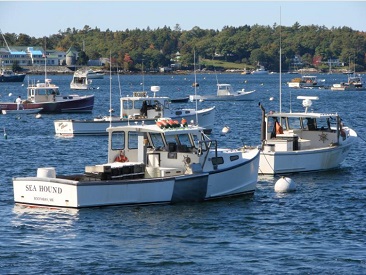
Maine lobstermen: The other endangered species?
When President Biden signs the $1.7 trillion omnibus bill into law, Maine’s lobster industry will take a six-year step back from the brink thanks to the efforts of Maine’s congressional delegation which secured a last-minute addition that put further restrictions to protect endangered right whales on hold. “The pause doesn’t mean this is over,” said Boothbay’s Troy Plummer, member of Maine Lobstermen’s Association (MLA) board of directors and lobster boat operator for nine years. “Everything is status quo until 2028, but we’ll have to do our homework,” said Boothbay Harbor’s Clive Farrin, lobsterman for more than 20 years and past president of Downeast Lobstermen’s Association. >click to read< 10:10
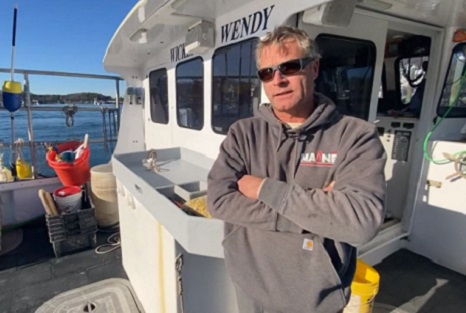
How could Maine lobster get off Monterey Bay Aquarium’s red list?
Jeff White, a lobsterman of 30 years out of York Harbor, said lobstermen from Maine are not hitting or having gear tangled in the endangered North Atlantic right whale’s path, which is the basis for all the increased regulations and legal battles in the first place. “Anyone using this body of water, interacting with the right whales, needs to sit at the table… you can’t just pick one, especially one that has no impact,” White said. “If you are interested in rebuilding the right whale population that is the wrong road to take.” But if the lobster industry wants to be taken off Monterey Bay Aquarium’s red list, and to be taken off suspension from the MSC, what exactly needs to be done? Video, >click to read< 09:34
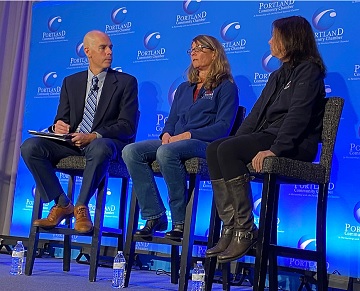
Lobster industry leaders vow to continue fight to protect Maine’s iconic fishery
Maine lobster industry officials told business leaders Thursday that they will continue to fight what they see as unfair and unnecessary federal rules meant to protect endangered right whales. “We are well over a $2 billion industry to the state primarily operating in communities without other job prospects,” Patrice McCarron, head of the Maine Lobstermen’s Association said. “It cannot be overstated.” Lobsterman Curt Brown, who is also a marine biologist, said the industry has been taking steps to protect the whales since the 1990s, including replacing floating ropes, using weak links so ropes break more easily and removing 30,000 miles of rope from the Gulf of Maine. >click to read< 07:34
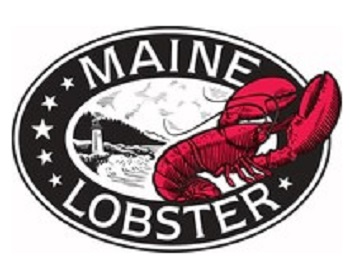
This National Lobster Day, Sept. 25th, Help Support the Maine Lobster Industry
The Maine Lobster fishery is one of the most sustainable fisheries in the world, thanks to the hard work by generations of lobstermen to protect both the lobster resource as well as Maine marine environment for more than 150 years. This includes decades of proactive changes to protect endangered right whales, including weakening lines, removing thousands of miles of rope from the water, and converting all ‘floating’ rope to safer ‘sinking’ rope. Yet, this month, the Monterey Bay Aquarium’s Seafood Watch program placed Maine Lobster on its “Red List” of seafoods to avoid, citing protection of right whales, ignoring decades of good faith conservation management and despite a lack of evidence of Maine Lobster fishery’s impact on the species. In fact, zero right whale deaths or serious injuries have ever been attributed to the Maine Lobster fishery. Here’s what you can do to do support the independent, hardworking fishermen of Maine: >click to read< 12:00

Maine lobster industry fights lawsuit that aims to shut down fishery
While Maine’s lobster industry has been fighting an offensive legal battle against impending rules to protect endangered North Atlantic right whales, it also is playing defense in a case brought by environmentalists that seeks to shut down the lobster fishery entirely. Lobster industry groups are intervening in a case brought in Washington, D.C.’s U.S. District Court by the Center for Biological Diversity and other plaintiffs that argues the new federal restrictions aren’t adequate, and that the fishery’s continued operation poses an existential threat to the whales. >click to read< 19:15
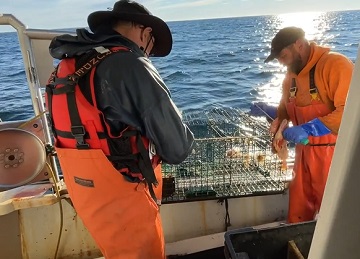
Maine Lobstering: A Family Business Facing Challenges
“Today, we really face multiple challenges including competition for the bottom fishing ground with plans to erect windmill generators, to huge increases in the price of bait due to limiting the Herring catches. Just getting new buoys made is tough,” said Capt. Steve Train, a lobsterman of Long Island, Maine. “There is a year-long wait for new traps because there aren’t a lot of people building them. And there is the closing of the federal offshore fishing grounds with the implementation of new regulations as part of the 1973 Endangered Species Act. All these challenges are driving our costs up.” West Bath, Maine Capt. Peter Doran agrees the industry has always faced challenges. photos, video >click to read< 19:04







































